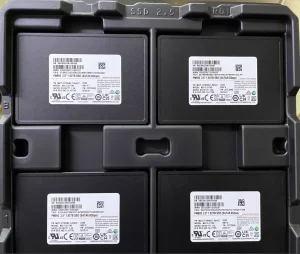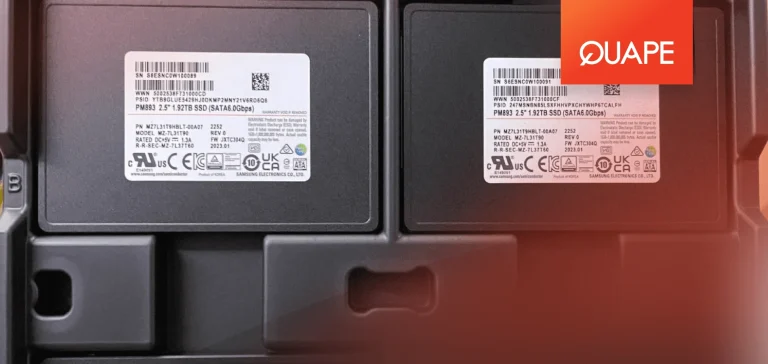If you’re looking to run a high-performance Virtual Private Server, choosing the right SSD is crucial. SSDs (Solid State Drives) directly impact your VPS speed, reliability, and overall performance. Whether you’re hosting websites, applications, or databases, the best SSD VPS setup can give you a massive advantage.
In this post, we’ll walk you through the top 5 SSDs used in the industry today to build the best SSD VPS environments for your hosting infrastructure.
Why SSDs Matter in VPS Hosting ?
Not all SSDs are created equal. When it comes to VPS hosting, you want SSDs that deliver:
Ultra-fast IOPS for handling concurrent requests
High reliability to avoid downtime
Better endurance for long-term data integrity
Power efficiency for optimized server performance
The following SSDs are trusted by data centers and hosting providers worldwide to deliver the best SSD VPS performance.
Consumer or Enterprise SSDs?
When it comes to VPS hosting, consumer-grade SSDs are generally not recommended. These drives are not designed for 24/7 operation and typically come with a lower endurance rating, often measured in TBW (Terabytes Written) — which indicates how much data can be written to the drive before it is expected to fail.
In contrast, enterprise-grade SSDs are built specifically for high-performance, continuous workloads in server environments. Here are some key advantages of using enterprise SSDs for VPS hosting:
Higher Endurance: Designed to handle significantly more write cycles, making them ideal for always-on environments.
Power Loss Protection: Helps prevent data corruption during unexpected power outages.
Consistent Performance: Maintains stable IOPS and latency, even under heavy workloads.
Increased Reliability: Engineered to be more resilient, with lower failure rates and better error handling.
Top 5 Recommended SSDs?

1. Samsung PM893 SATA SSD
Best Overall for Enterprise VPS
Interface: SATA III (6 Gb/s)
Form Factor: 2.5″
Endurance: Up to 3 DWPD
Capacities: 240GB – 7.68TB
Power Loss Protection: Yes
The PM893 is one of the most popular choices among datacenters for building enterprise SSD VPS infrastructure. It offers consistent latency, excellent TBW, and supports end-to-end data protection.
Pros: Exceptional endurance, proven reliability
Cons: Slightly more expensive than budget enterprise SSDs
2. Intel D3-S4610 Series
Reliable and Cost-Effective
Interface: SATA III
Form Factor: 2.5″
Endurance: 1 DWPD
Capacities: 240GB – 3.84TB
Power Loss Protection: Yes
The Intel D3-S4610 is a staple in VPS and cloud environments thanks to its power efficiency and long-term reliability. Great for read-intensive workloads like website and app hosting.
Pros: Low power draw, excellent price-to-endurance ratio
Cons: Not designed for heavy write workloads
3. Micron 5300 MAX SATA SSD
Built for Mixed Workloads
Interface: SATA III
Form Factor: 2.5″
Endurance: Up to 5 DWPD
Capacities: 240GB – 7.68TB
Power Loss Protection: Yes
The Micron 5300 MAX is engineered for high-endurance environments. Perfect for VPS nodes with database-heavy or mixed read/write usage.
Pros: High endurance, robust firmware, strong thermal management
Cons: Higher power usage
4. Kioxia (Toshiba) HK6-DC Series
Interface: SATA III
Form Factor: 2.5″
Endurance: 1–3 DWPD
Capacities: 240GB – 3.84TB
Power Loss Protection: Yes
A lesser-known but enterprise-trusted SSD, the HK6-DC series is designed for 24/7 workloads in hosting and hyperscale environments. Kioxia’s enterprise line is known for endurance and stable latency.
Pros: Trusted brand in OEM servers, consistent write performance
Cons: Less mainstream support/documentation
5. Seagate Nytro 1351 SATA SSD
Interface: SATA III
Form Factor: 2.5″
Endurance: 1–3 DWPD
Capacities: 240GB – 3.84TB
Power Loss Protection: Yes
The Nytro 1351 is optimized for enterprise use in read-intensive applications. It’s widely used in hosting environments and supports features like SED (Self-Encrypting Drive) for secure VPS hosting.
Pros: Enterprise-grade reliability, security-focused
Cons: Write performance not as high as mixed-use SSDs
Final Thoughts on the Best SSD VPS Setup
If you’re building a reliable, high-availability VPS infrastructure, investing in enterprise-grade SATA SSDs is non-negotiable. These drives deliver the consistency and endurance required for:
24/7 uptime
Multi-tenant VPS nodes
Database and application hosting
Critical backups and snapshots
Unlike consumer SSDs, these drives feature power loss protection, better error correction, and firmware optimized for virtualized environments — all essential for the best SSD VPS experience. Check out VPS Hosting plans for high performance NVME SSDs which is 5 times faster performance then convetional SSDs.
Eddie Cheng
As the leader of a team of full-stack developers, Eddie Cheng combines hands-on experience with a love for writing and sharing insights on cutting-edge technology. From web design and app development to corporate IT systems, Eddie Cheng brings deep expertise and a practical perspective to every article.
In addition to writing and reading about technology, Eddie Cheng enjoys sharing findings with a wider audience, helping readers navigate the fast-paced world of tech.
- Top #5 Best SSD VPS 2025 - April 8, 2025
- WP Engine Banned from WordPress - March 28, 2025
- Top 10 Opensource Tools for Business - March 28, 2025



